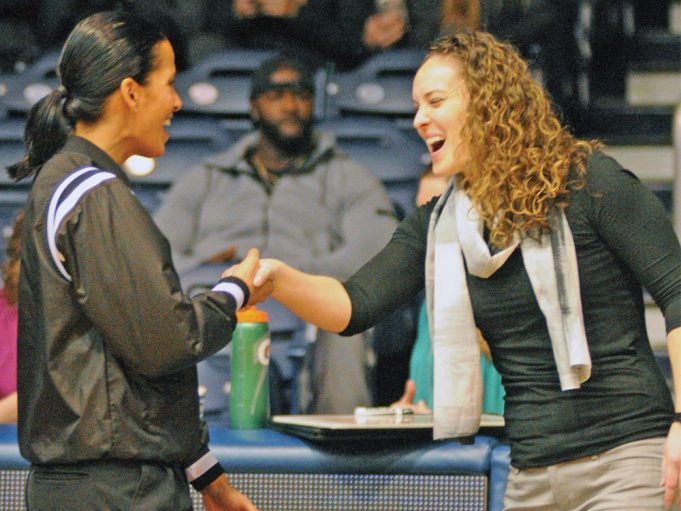Sports officiating is an emotional challenge. Gonzaga University’s Rachelle Strawther knows this firsthand after her experience running a sports and officiating soccer program in Kenya. She saw players on fields strewn with rocks, no cleats, fights, awful playing conditions, and players, coaches and referees unequipped to deal with some of the deep emotions that run through sports.
“Too often it’s just about training fundamentals. We want to ‘develop’ officials. That’s a process over the longer term,” she said.
Strawther speaks to diverse audiences on leadership issues and plans to focus her remarks at the Sports Officiating Summit this Monday on the “development” side of officiating. Titled “Get Them to Believe,” Strawther’s presentation will help officials bridge to the next level of development in their careers. “There’s a technical side and an emotional side to officiating. The general challenge today is transcending the technical side, which is the training portion, and moving toward the developing side,” she said.
“Trainer blockage” may sound like an odd term. But Strawther uses it to frame the discussion on where to take training. “Trainers tend to understand things through their own personal lens. Instead, we need to move toward meeting people at their level,” she said.
Emotional intelligence has three major components, according to Strawther: self-awareness, self-regulation and empathy.
Self-Awareness
First, a trainer must become self-aware. How a trainer frames a session leads directly to how effectively trainees absorb and execute lessons. If there’s a blank face, the messages aren’t coming through and the trainer needs to recalibrate, ask questions, find out why there is a lack of understanding.
Self-Regulation
Secondly, officials need personal self-regulation. What does that mean? It’s not something that can be taught. It has to be developed on the court or field in a stressful environment. When you are yelled at because of a call, you learn to regulate your emotions and rebalance.
Empathy
Finally, there is empathy. This requires the official to see things the way others seem them and develop a deeper understanding of what others see and feel. Officials must get to that level with others and connect with them to improve their success.
“You can’t go back,” Strawther said. “We need to make sure officials in their training are addressing personal strategies for them to move forward.”
Learn from the past. Apply to the future.
“We have to connect the head to the heart. When things are uncivil or going wrong on the court or field, how will an official react? Do you react with emotion or regain your balance and take the high road?” Strawther asked.
What's Your Call? Leave a Comment:
Note: This article is archival in nature. Rules, interpretations, mechanics, philosophies and other information may or may not be correct for the current year.
This article is the copyright of ©Referee Enterprises, Inc., and may not be republished in whole or in part online, in print or in any capacity without expressed written permission from Referee. The article is made available for educational use by individuals.


















